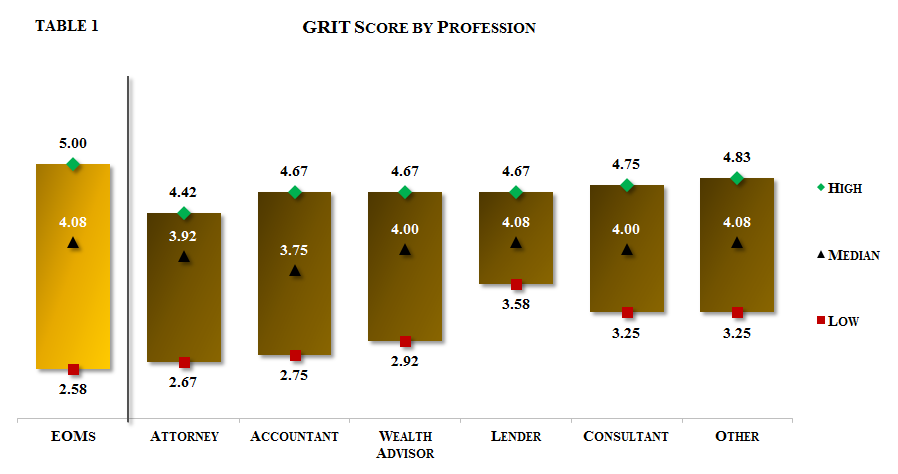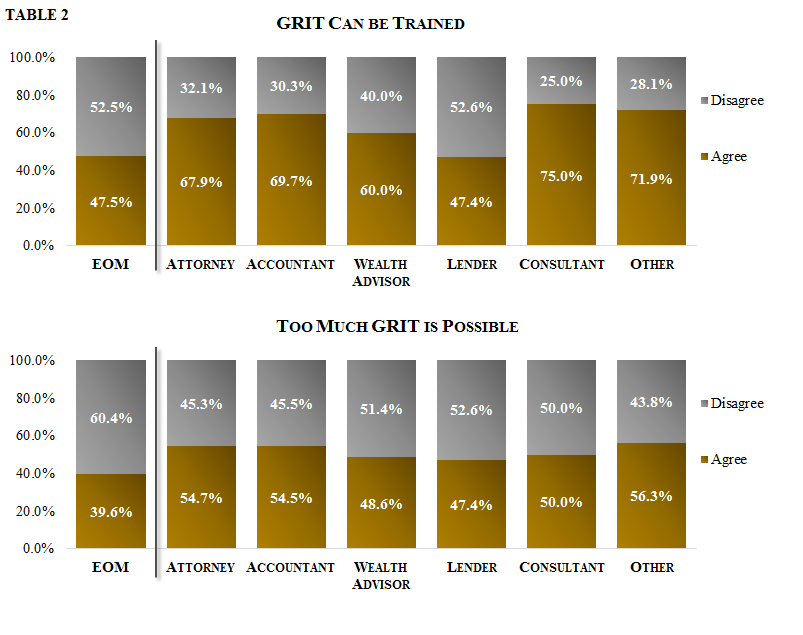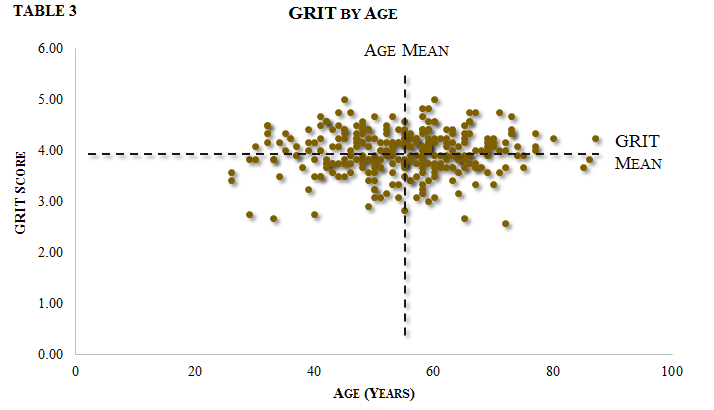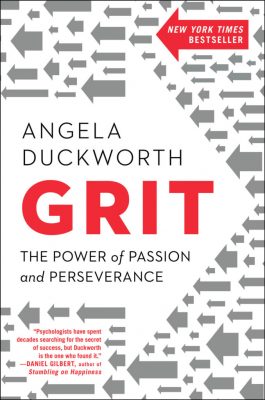Grit—defined as passion and perseverance for long-term goals—has attracted attention as a predictor of success in various fields, and thanks to our friend Dr. Angela Duckworth, is currently a global topic of discussion for parents, educators, investors, entrepreneurs, performers, leaders, psychologists, and others. Bigelow’s first work on the measurement of Grit in seasoned, successful Entrepreneur Owner-Managers (“EOMs”) was initiated back in 2009.
The work of University of Pennsylvania psychologist (and now New York Times Bestselling author) Angela L. Duckworth, PhD, was the original inspiration for our applying the measurement of Grit to EOMs. She suggests Grit is a valid predictor of long-term success shared by the most prominent leaders in many fields, and we are interested if that is aligned in seasoned successful EOMs. Further, she suggests that measures of Grit are a more accurate predictor than talent, or general indicators of intelligence. In her schema, Grit has two related but distinct parts: effort (passion) and interest (perseverance). We view her work as an original, even pioneering component of the larger topic of the psychology of peak performance or psychology of effort, both of which interest us as they apply to EOMs making better decisions to achieve their goals.
We have aggregated and summarized the results of our 2016 research in Table 1 below:

The current Bigelow research of over 300 adults (EOMs and Expert Advisors), yielded a median Grit score of 4.00 compared to the median for all American adults of 3.80. Unsurprisingly (at least to us, given the animal spirits we work with!), it was the EOMs who scored both the absolute highest at 5.00 and lowest of the range 2.58 (not advisors who had less variability). The EOMs (these are seasoned, successful EOMs, not wanna-be’s) Grit scale is high absolutely, and has the widest variation around the median of the groups. It’s interesting to us that it is not uniformly high which is what the general media or the mass popular culture probably believes. The Grit finding has implications for investors and advisors who might think that “all” EOMs are gritty.
We also asked our sample to answer two questions having to do with whether Grit can be learned or trained (Duckworth says yes), and if one can have too much grit. Table 2 summarizes results.
 EOMs and lenders scored the highest in believing that GRIT cannot be trained. I “get” that consultants scored the highest that GRIT can be trained, but that EOMs think it is not able to be trained is interesting considering the national dialogue.
EOMs and lenders scored the highest in believing that GRIT cannot be trained. I “get” that consultants scored the highest that GRIT can be trained, but that EOMs think it is not able to be trained is interesting considering the national dialogue.
Similarly, EOMs score was the highest asserting that there is no such thing as too much Grit.
Hmmm…our own experience might not be perfectly aligned with that, how about yours? We tend to see Grit on a spectrum where if slacker / quitter (or some descriptor like that) is on one end, then stubbornness or ignorance might be on the other, with Grit in a good place, say, 75% of the way from quitter. But we have also experienced cases (have you?) where Grit turned into doggedness, unwillingness to change, stubbornness, and ultimately, perhaps a form of what you might term self-destruction.
The lack of variability around age surprises us. We do have a solid group of professionals mostly hitting their stride in their 50s and that may account for it but still, no curve there at all. Duckworth’s research strongly suggests higher Grit is correlated with absolute age. Table 3 highlights below.
 Anecdotally, we frequently see seasoned, successful EOMs pursue their goals over very long periods of time—often 30-40 years. These “skin in the game” principals obviously perceive their goals as important, and benefits of reaching them to be extremely high. We are interested too, in the application of Deliberate Practice to achieving these goals. Deliberate Practice is the effortful striving towards a very specific goal whose level of difficulty exceeds current skill and requires feedback—more than mere repetition. We also know that random luck or chance plays a meaningful part in achievement.
Anecdotally, we frequently see seasoned, successful EOMs pursue their goals over very long periods of time—often 30-40 years. These “skin in the game” principals obviously perceive their goals as important, and benefits of reaching them to be extremely high. We are interested too, in the application of Deliberate Practice to achieving these goals. Deliberate Practice is the effortful striving towards a very specific goal whose level of difficulty exceeds current skill and requires feedback—more than mere repetition. We also know that random luck or chance plays a meaningful part in achievement.
Our thesis is successful achievement leaves clues. So deconstructing high performing EOMs to find the clues may give us patterns of knowledge that point the way. The difference in outcome and timing of our two chapters of Grit research—3.68 in 2009 and 4.08 in 2016—makes us wonder if the exogenous environment affected respondents’ self score. The disruptive energy of the 2008-2009 recession did not just destroy a lot of paper wealth. In a way, it put the period on the end of an old order, a conventional adoration of the industrial age bureaucratic firms and their salaried (non-owner) managers who have no skin in the game. EOMs score more grittily today. Could the increased evidence of the pro-social and pro-economic benefits of EOMs mature their view on their own Grit?
Duckworth’s research shows Grit is more predictive than talent for achievement. Our research confirms that EOMs have a much higher level of Grit than the general population. Is Grit inborn and those high in Grit become successful EOMs or… the other way around where in becoming a successful EOM you overcome adversity and develop Grit? What is cause and what is effect? This research was with successful EOMs. Do unsuccessful EOMs also have Grit? We need to learn more—good work for another day.
We believe Bigelow conducted the first study investigating the relationship between Grit and seasoned successful private company entrepreneur owner-managers (in 2009), and the 2016 follow-on study continues as the only research of its kind of which we are aware.
References and Continued Reading
Csikszentmihalyi, M. Flow. New York, NY: HarperCollins. 1991. Print.
Csikszentmihalyi, M. Creativity: Flow and the Psychology of Discovery and Invention. New York, NY: HarperCollins. 1997. Print.
Csikszentmihalyi, M. Finding Flow: The Psychology of Engagement with Everyday Life. New York, NY: Basic Books. 1997. Print.
Duckworth, A. L., Kirby, T., Tsukayama, E., Berstein, H., & Ericsson, K. Deliberate Practice Spells Success: Why Grittier Competitors Triumph at the National Spelling Bee. 2010. Online.
Duckworth, Angela. GRIT: The Power of Passion & Perseverance. New York: Scribner, 2016. Print.
Ericsson, Anders, and Robert Pool. Peak: Secrets from the New Science of Expertise. Boston: Houghton Mifflin Harcourt, 2016. Print.
Social Psychological and Personality Science, 2, 174–181. Duckworth, A. L., Peterson, C., Matthews, M. D., & Kelly, D. R. Grit: Perseverance and Passion for Long-Term Goals. Journal of Personality and Social Psychology, 92, 1087–1101. 2007. Print.
Duckworth, A. L., & Quinn, P. D. Development and Validation of the Short Grit Scale (Grit-S). Journal of Personality Assessment, 91, 166–174. 2009. Print.
Duckworth, A. L., Quinn, P. D., & Seligman, M. E. P. Positive Predictors of Teacher Effectiveness. The Journal of Positive Psychology, 4: 6, 540–547. 2009. Print.
Seligman, M. E. Authentic Happiness. New York, NY: Free Press. 2002. Print.
Seligman, M. E. Flourish. New York, NY: Simon & Schuster. 2011. Print.

